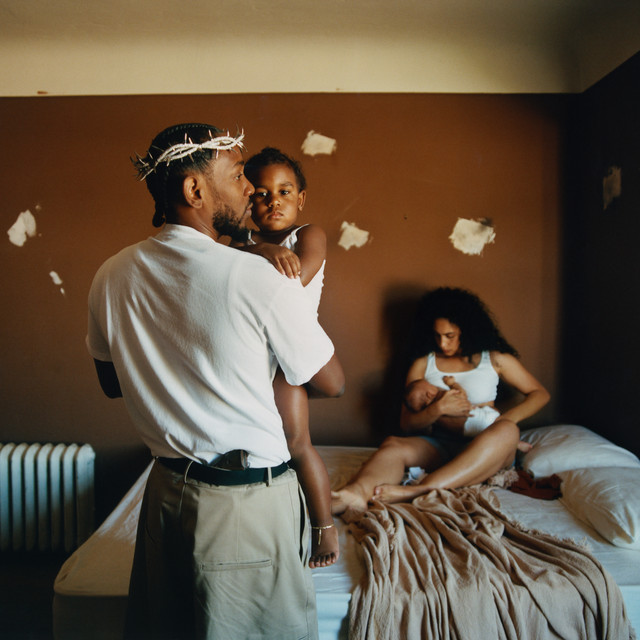By: Tommy “T-Rod” Rodriguez
“I’ve been going through something. One-thousand eight-hundred and fifty five days, I’ve been going through something. Be afraid.”
Kendrick Lamar, “United in Grief”
These are some of the first words one will hear on Kendrick Lamar’s long-awaited album, Mr. Morale and The Big Steppers. Foreboding, emotionally bare, and hyper-focused on detail, this line alone is a perfect taste of what Kendrick delivers on this anticipated double disc. Continuing his run of boundary-pushing and cinematic hip-hop that began with Section 80, Kendrick’s final album on Top Dawg Entertainment is possibly his most visceral and human. The album is a therapy session, one where Kendrick battles the demons of his upbringing and the savior complex so many spring upon his music.
Pulling off a double album is one of music’s hardest feats: very few artists have fully pulled off the double LP format (exceptions being Outkast, Pac, KRIT, Tribe), but Kendrick employs it well. Side 1 and 2 play off each other nicely, with Side 1 being a brazen, dark exploration of Kendrick’s mind while Side 2 giving listeners the catharsis of letting go of said darkness.
Side 1: Reflection and Pain
“United in Grief” sets the tone perfectly for Side 1: odd drums and naked keys back a stellar exploration on empty material splurges. Aside from being an incredible performance from Kendrick on the mic, the track sets up a lot of key themes the album explores: addiction, Kendrick’s growing savior complex, trauma. This trauma and addiction is explored further on the genius “Worldwide Steppers,” wherein Kendrick reflects on his behavior towards women and his community. It’s one of his most eye-opening tracks, giving fans a direct insight into how guilt, toxic thinking and fear has infected Kendrick even since the good kid MAAD City days.
Side 1 in particular feels toxic, but in a self-destructive fashion. Many of the songs feel like Kendrick digging into himself and the world around him as he struggles with his inability to solve societal issues. The beautiful reflection on father-son time on “Father Time” carries a strong sense of gratefulness. In the same breath, however, there’s a sadness in Kendrick’s last verse as he reflects on peers suffering due to a lack of guidance. “N95” is an absolute rager, but the song almost feels like Kendrick reminding himself to stay strong, take off his fake cool and fake woke and be himself amidst a crowd of fakes. “Rich Spirit” is a breezy high of self-confidence, but that high is blown on the subsequent “We Cry Together.” On this track, Kendrick and Taylour Paige go off on each other, playing a couple arguing in back and forth rhymes that destroy any notion of a healthy relationship. This is Kendrick at his best: choosing a guest to play a character that accentuates the track’s themes, a twisted Eminem-type concept that is played out in cinematic and nasty detail? All while offering a hard-hitting perspective on the gender wars you see crop up on social media…it’s raw human emotion filtered through Kendrick and Paige’s warped perspectives.
And that’s the key here: more so than ever, this record is entirely Kendrick’s perspective, naked and without filter. The album as a whole feels like you’re watching Kendrick go through an extensive day of therapy: at times it’s as quiet as a simple discussion, at others it’s as loud and destructive as smash therapy. Unlike DAMN, however, this self-examination and destruction leads to a positive conclusion on Side 2. After the psychedelic slow burn of “Purple Hearts,” the true character development begins on…
Side 2: Growth and Forgiveness
If Side 1 finds Kendrick breaking his persona into a million pieces, Side 2 sees him put himself back together. While it still maintains the general dark, introspective nature of the first half, Side 2 is much more metally stable from the get go.
“Count Me Out” sees Kendrick referencing his doubters: he wants to take his challenges in stride, including his doubters. Loneliness and perfectionism is something that has always pervaded his music, and that theme is bluntly addressed on “Crown,” one of the album’s most quiet and powerful moments. Similar to the song “FEEL,” this track is incredible at giving the listener a clear view of Kendrick’s mind, the keys ringing out resembling the cavern of his conscience. The world heralds him as the king of music and social consciousness…but that crown is laced with thorns. Being a king of hip-hop sounds tiring, and for the first time ever, Kendrick seems like he’s forgiving himself for possibly not being the perfect man fans wants him to be.
Imperfection is then explored on the back end of this LP, to great effect. “Savior” boasts a great message about upholding your music and sports idols as gods…but if they lift the veil of their celebrity will you still love them? “Heroes lookin’ for the villains to help” is one of many lines here that are thought provoking and direct at music standoms all over. The following “Auntie Diaries,” a narrative track about Kendrick coming to terms with transgender family, very much continues this thread of imperfection. On this quiet song, Kendrick lays bare his past biases and use of transphobic/homophobic slurs, both to show his immaturity and his current growth…but here the execution is very much confusing. While the message is sorely needed in today’s music landscape, his use of slurs will certainly not work for many. Does this further the theme of imperfection and growth on the album, or is it a crude use of a slur to make a blunt point? It will ultimately depend on the listener to make that decision, but people offended by the use of this word have every right to be.
Despite a stumble here and there on Mr. Morale and The Big Steppers, the record finishes strong with its closing moments. “Mother I Sober” is a beautiful examination of Kendrick’s growth as a person: overcoming abuse and addiction, forgiving himself for his mistakes and his imperfections, dedicating himself to family? It’s a wonderful culmination of the album’s themes, a soft climax that gives hardcore Kendrick fans a retroactive look at his past albums: they very much seem like steps he took to being truly happy. “Mirror” is equally poignant, a sweet pop rap jam that is all about Kendrick simply choosing himself over the savior complex people have showered over his career. “I chose me, I’m sorry” he says sheepishly, almost shrugging at his stans as he finally seems to relax and take a deep breath…
Which initially was the end of this focused album review body but “The Heart Part 5” is now our official closer and I love it. It’s a perfect 180 on Kendrick’s persona throughout the album, opting to leave listeners with a powerful message of self-reflection, improving the lives of future generations, and finding a greater purpose. It was an excellent teaser, and an even better closer.
Random Thoughts/Closing Thoughts
Before I give my final thoughts on this album (trust me this could’ve been way longer than it currently is), I still have some speed round thoughts I want to get off my chest.
- I really loved the production on this album: while it’s a bit all over the place stylistically, every beat matches the song it is on perfectly, with transitions moving nicely between tracks. I really loved how emotionless and cold “Worldwide Steppers” was and the hard drums and keys of “Father Time.”
- Generally, this is the first album from Kendrick where he blatantly tries to make a “hit” frequently. I do think this holds the album back a bit, as going from super serious topics to a song like “Die Hard” is jarring, but that’s purely a preference. “Silent Hill” is a great balance of popular sounds while still working as an album cut.
- I think every feature in general was good to great: I think Baby Keem and Ghostface Killah had my favorite guest contributions, especially Keem with his monologue-esque verse on success on “Savior (Interlude).”
- I think the inclusion of Kodak Black as a prominent guest was…interesting. I think his interlude was a great example of how he can paint a picture, and his problematic past definitely works in line with Kendrick’s commentaries on morality and sin. I do not think it was the most tasteful inclusion on the record though, even if it was designed to make in-the-know rap heads make conclusions.
In general, I think Mr. Morale and The Big Steppers was designed to make Kendrick fans feel off balance. It’s easily Kendrick’s most blunt and honest record from a personal standpoint, but not in a way that paints Kendrick as a perfect figure. I like to think of it as Kendrick’s “performance art” project, one wherein he completely exposes himself to the listener and leaves them thinking about the terrifying and beautiful implications within his psyche. While not as graphic or disturbing as some of the most extreme performance art done (look up Rhythm 0 by Maria Abramovic), I think it accomplishes a similar goal.
You have now seen the darkness in Kendrick’s mind and life. He’s as human as you and I, and from this point he will live for himself and not the savior role he and other thrust onto himself. I think that choice in and of itself is a wonderful thing.
Tracks to Save: “United in Grief,” “N95,” “Worldwide Steppers,” “Father Time,” “Rich Spirit,” “We Cry Together,” “Count Me Out,” “Silent Hill,” “Savior,” “Mr. Morale,” “Mother I Sober,” “The Heart Part 5”
Tracks to Skip: “Die Hard”
SOFLOSOUND.com is your one stop shop for a music fan’s music reviews, profiles, and essays. By the youth, for the youth, and allied with all oldheads, everywhere. Leave a comment below on what you want to see next!



